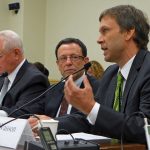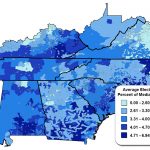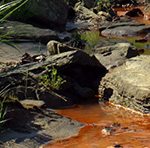Written by Tom Cormons
Tom Cormons
Appalachian Voices' Executive Director, Tom holds a degree in law from UCLA and has a life-long appreciation for Appalachia's mountains and culture. An avid hiker and whitewater rafter, his latest pleasure is in sharing with his kids a deep respect and appreciation of nature.
The Chief lives on
 Appalachian Voices executive director Tom Cormons offers a heartfelt sendoff to Lenny Kohm, who passed away unexpectedly in late September. Lenny was an activist who inspired countless people, from the Arctic to Appalachia, to stand up and exercise their right to protect the land and communities they love. He will be missed by all, but his legacy lives on.
Appalachian Voices executive director Tom Cormons offers a heartfelt sendoff to Lenny Kohm, who passed away unexpectedly in late September. Lenny was an activist who inspired countless people, from the Arctic to Appalachia, to stand up and exercise their right to protect the land and communities they love. He will be missed by all, but his legacy lives on.
To tell the truth

Last month, our director of programs, Matt Wasson, testified before Congress about the perils of mountaintop removal and coal ash pollution, and the failure of some state agencies to protect communities from pollution. While Matt had a rare opportunity to provide a reality check for elected leaders, it’s the people in coal-impacted communities who know this reality better than anyone.
Strip mine highway gets a hard look

The Coalfields Expressway as currently proposed is not a classic “road to nowhere” boondoggle, but it is a road to the destruction of mountains, creeks and economic opportunities in Southwest Virginia. So it was a joyous day in June when we learned that, after many years of collaborative effort by Appalachian Voices and partner groups, and the persistence of countless citizens across the region, federal officials had put the brakes on it.
Amplifying citizens’ voices

Earlier this month, a group of Appalachian citizens traveled to Washington, D.C., to tell members of Congress and Obama administration officials how mountaintop removal coal mining has contaminated drinking water, poisoned streams, polluted air, and devastated local economies in their communities. Judging by the reaction, their stories hit home with many of these decision makers.
The Carbon / Climate Challenge
 In a few weeks, the U.S. Environmental Protection Agency is set to unveil the nation’s first-ever proposal to limit planet-warming carbon pollution from the nation’s existing power plants — the single largest contributor to America’s carbon footprint. This is a critical opportunity to move the needle away from dirty fossil fuels and the destruction they wreak — including mountaintop removal and poisoned water and air — and toward cleaner, more sustainable ways to power our lives.
In a few weeks, the U.S. Environmental Protection Agency is set to unveil the nation’s first-ever proposal to limit planet-warming carbon pollution from the nation’s existing power plants — the single largest contributor to America’s carbon footprint. This is a critical opportunity to move the needle away from dirty fossil fuels and the destruction they wreak — including mountaintop removal and poisoned water and air — and toward cleaner, more sustainable ways to power our lives.
Counteracting Coal’s Dirty Tricks
Electricity Costs Tied to Poverty in the South
 Fifty years ago, President Johnson declared a “war on poverty” in America, and Congress passed legislation to increase support and economic opportunities for the poor. Appalachia was the “poster region” for this grand endeavor. Today, a “war on wasted energy” makes sense for many reasons, and it would provide a much-needed boost to communities in Appalachia and across the South who are most in need.
Fifty years ago, President Johnson declared a “war on poverty” in America, and Congress passed legislation to increase support and economic opportunities for the poor. Appalachia was the “poster region” for this grand endeavor. Today, a “war on wasted energy” makes sense for many reasons, and it would provide a much-needed boost to communities in Appalachia and across the South who are most in need.
Coal-related Spills Connect Us All

Over the last several weeks, with each report from West Virginia or North Carolina of a coal-related water pollution crisis, I couldn’t help but imagine my favorite river, the Moormans, being poisoned by a mysterious chemical called MCHM, choked by toxic coal ash, or fouled by coal slurry. In fact, it is my river that is threatened. And your river, too. But our shared connection to the creeks and rivers running through our lives unites us in the fight to protect our waters, and that’s what gives me hope.
West Virginia’s Water Crisis: As Predictable As It Was Preventable

On Thursday, Jan. 9, more than 7,500 gallons of a highly toxic chemical used to process coal spilled into the Elk River — just upstream of a drinking water intake serving more than 300,000 people in West Virginia. While the spill was making national headlines as a one-time event, our thoughts turned to the much bigger problems with water pollution and politics in Appalachia that don’t get enough attention from the media — and how these chronic problems actually set the stage for this disaster.
Reflecting on a Year of Accomplishments
It was ten months ago when I wrote my first letter to our supporters as the Executive Director of Appalachian Voices. Looking back on the time that has flown by, I take great comfort in knowing that over this short span we made many impressive advances in reducing coal’s impact on our communities and promoting solutions for a cleaner energy future. With the end of 2013 only days away, I want to personally let you know how grateful we are for your commitment to our work this year. Thank you.
Here are just a few highlights of all that we did with your help.



